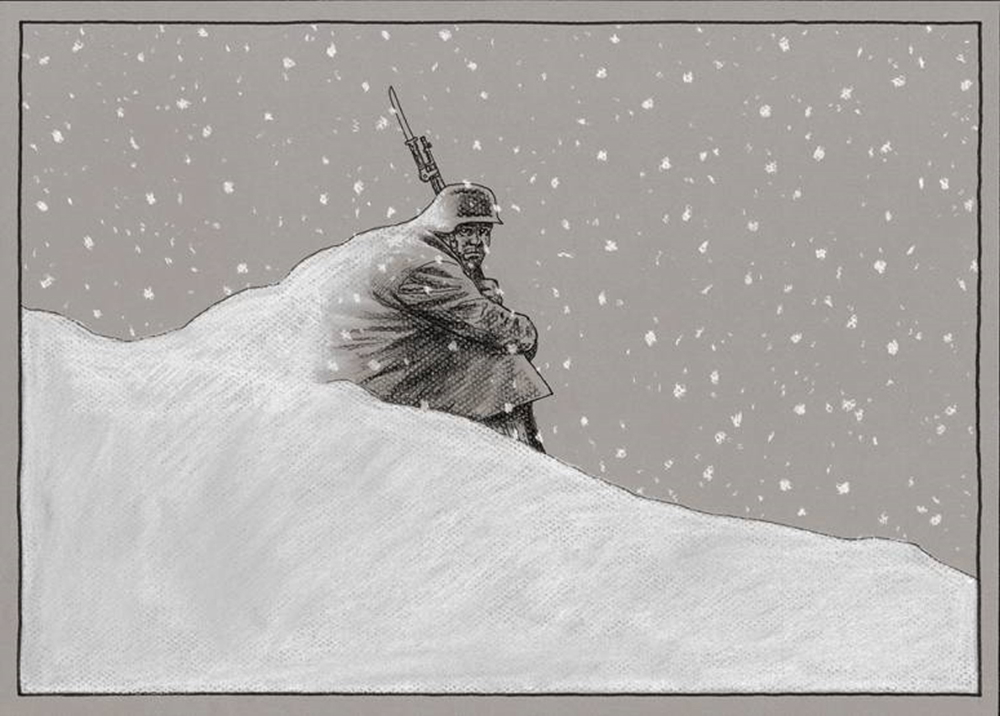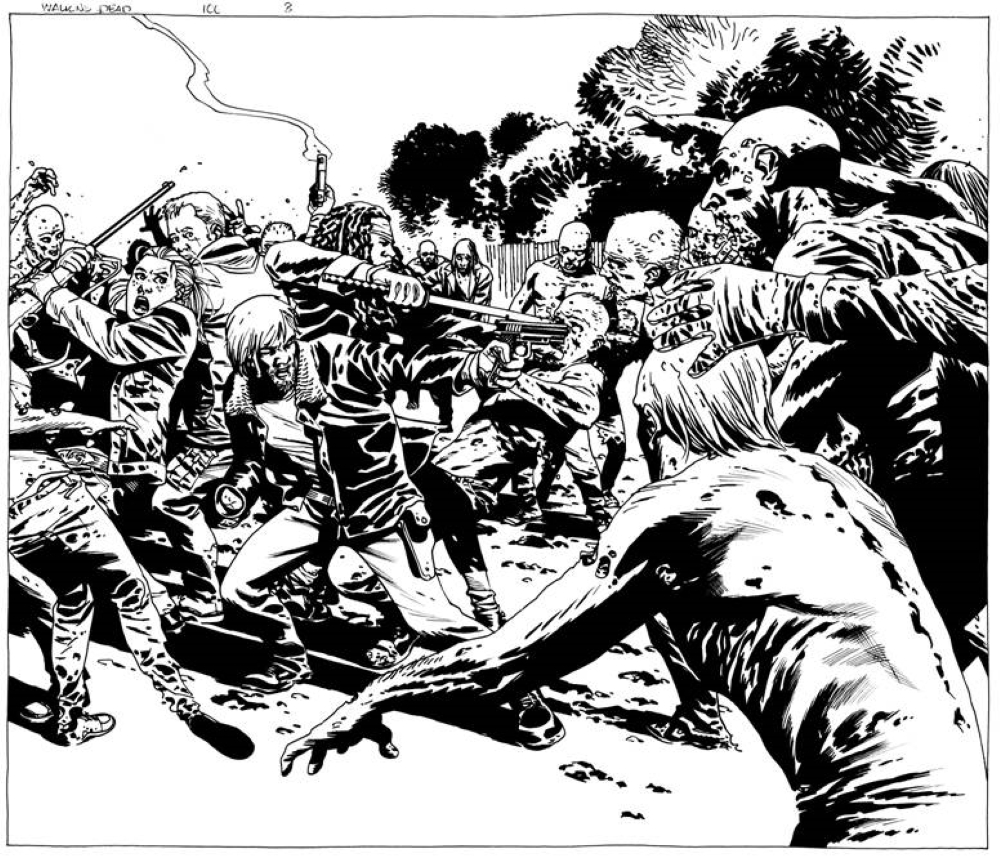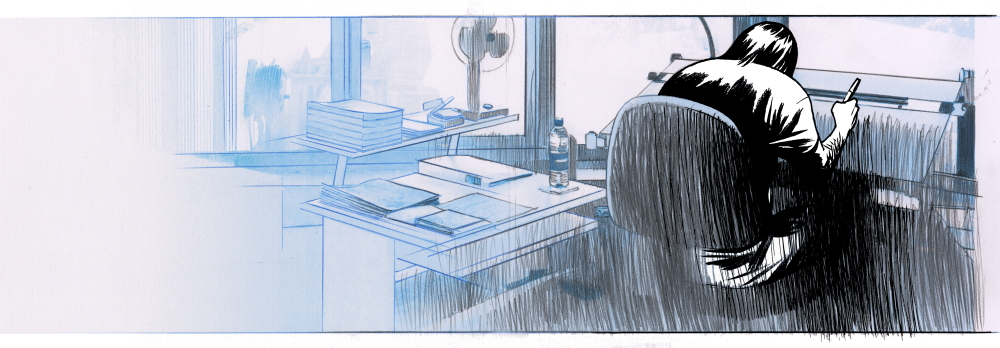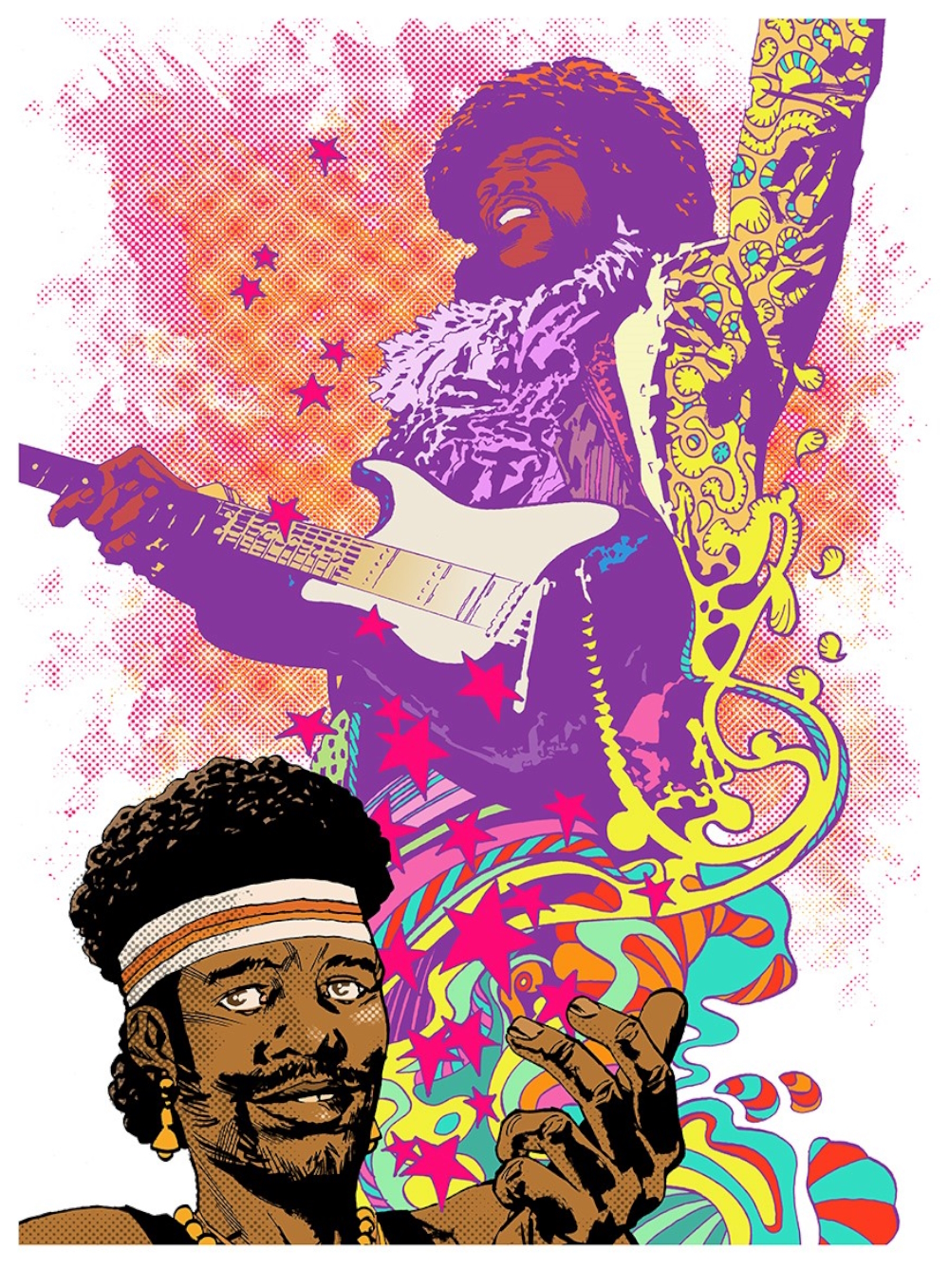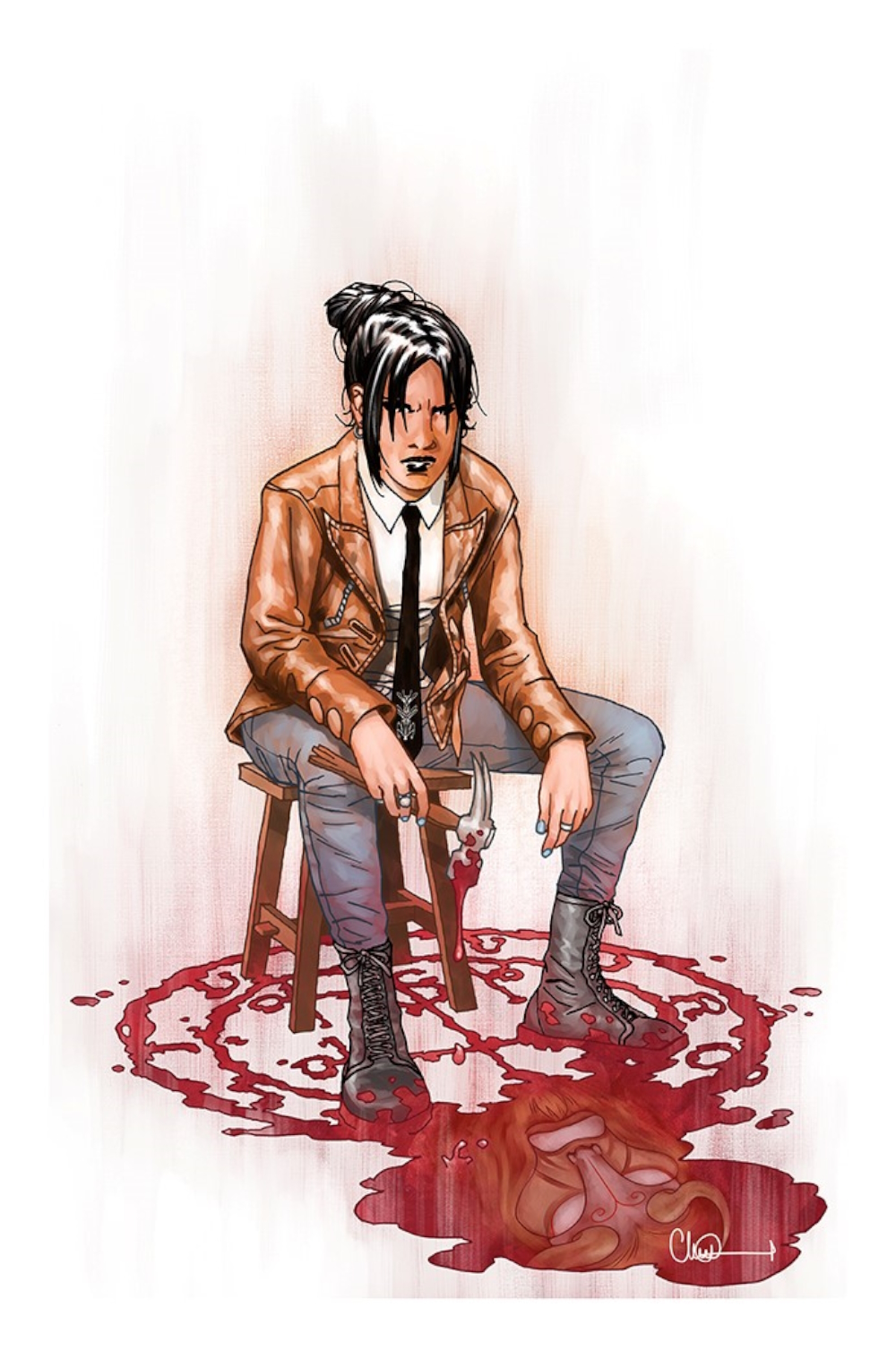Charlie Adlard
comic book artist / illustrator ("The Walking Dead")
GB
For 'The Walking Dead', the monthly American comic series, he was in charge between 2004 (# 7) and 2019 (# 193): Charles "Charlie" Adlard. The cartoonist, who lives near Birmingham, literally drew EVERYTHING ‚TWD‘ related until it came to an end. For 15 years in a row he illustrated the serialised story by author Robert Kirkman on which the television series of the same name is based. It centres on a group of people struggling to survive in the devastated USA after a worldwide zombie apocalypse. 'The Walking Dead' is not only one of the most highly acclaimed and successful US independent comic series, but was also awarded the prestigious Eisner Prize for "Best Continuing Series" in 2010, and Charlie Adlard was nominated for "Best Artist".
Charlie Adlard
comic book artist / illustrator ("The Walking Dead")
GB
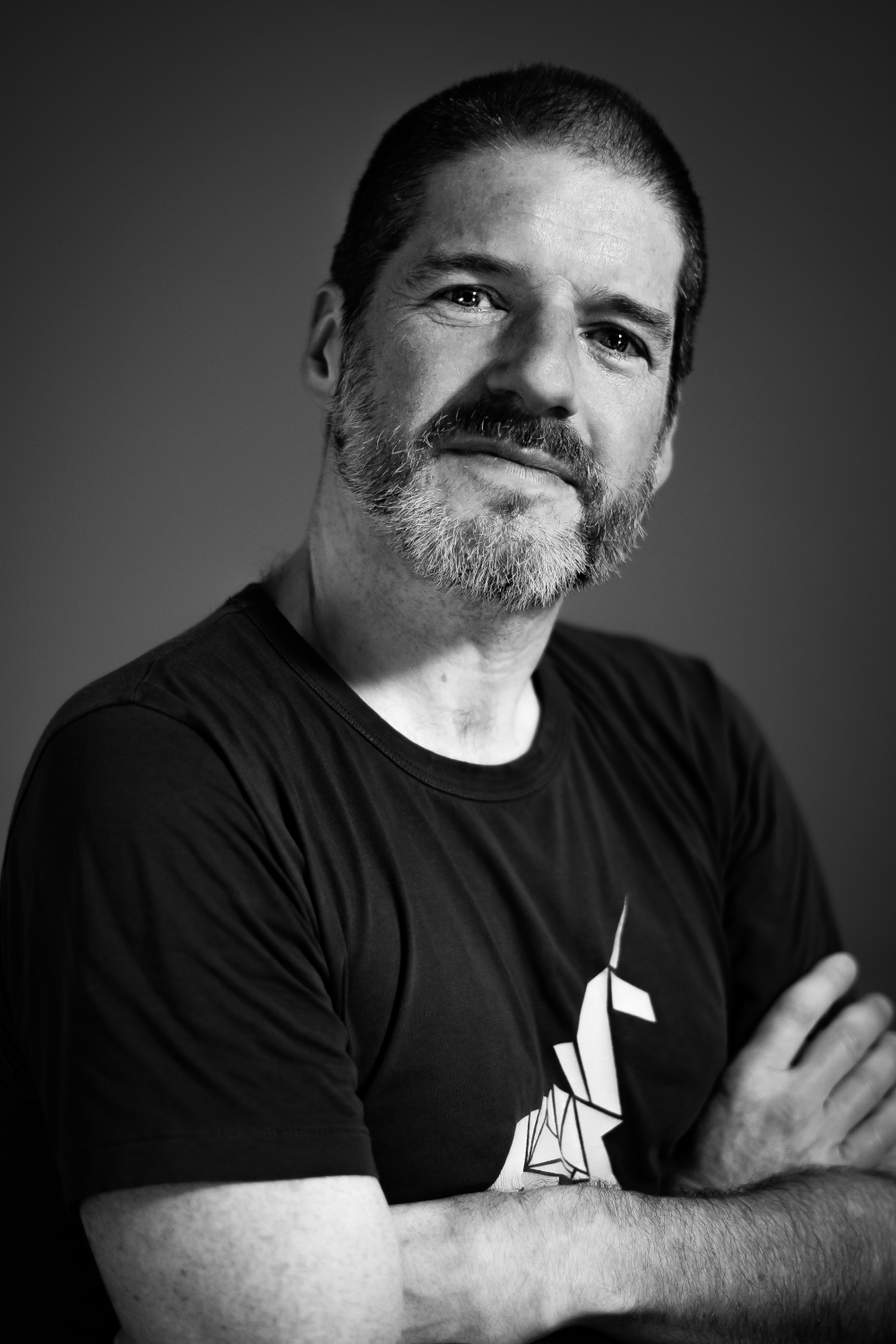
Born in England (* 4 August 1966), Charlie Adlard began designing comics as a child. As an art school graduate, he was not able to enter the film industry as he had hoped, nor was he able to pursue a career as a rock drummer, so he turned to his talent for drawing. Two years of work on a personal portfolio were a good investment: in 1992 he succeeded in getting published in the British 'Judge Dredd Megazine'. That was the starting signal for an impressive career in comics. Since then, the artist has been engaged for famous comic series such as 'Superman', 'Batman', 'X-Men', 'Mars Attacks!' or 'X-Files', but also realised 'Playing The Gam'", written by Nobel Prize winner Doris Lessing, as a graphic novel.
While Charlie Adlard still delivered hand-painted, multi-coloured drawings at the beginning of his professional career, he has long preferred black-and-white drawings. For an internationally known veteran of the comic industry, his tools of the trade are as minimalist as they are straightforward: a Rotring pencil for the lines and an Isograph 2.5 for stronger blacks and textures. In addition, there is sometimes a Pentel brush and erasers. Because he describes himself as a technophobe, the Apple computer is only used for the basics and to scan the results at the end for sending by e-mail.
Charlie Adlard is married. He lives with his wife and two children and a cat in his birthplace of Shrewsbury (GB).
Interview October 2015
Pure horror: long time visits by 'The Walking Dead'
ABOUT INTUITION / IMAGINATION / INSPIRATION
Is the timeframe of intuition only temporary or can it be supported by external factors?
So far it’s always been permanent, so I see no reason that’s going to change… :-)
Do calm and relaxation further the „best“ or is a tight deadline a stimulant for creativity?
I find a deadline provides that little extra "kick" into productivity. If I'm too relaxed, the work doesn’t get done.
Which place/what environment is best for the creation / work process?
My studio, my workplace – official creativity.
What if there is a deadline, but no intuition? Does the first fuel the latter maybe?
Never happens...
Before intuition, is inspiration the primary catalyst? If so, what inspires you?
I'm inspired as soon as the blank sheet of paper is in front of me. Luckily, I’ve never had these sort of problems.
According to Philip Roth, “amateurs wait for inspiration while professionals sit down and work.” How do you feel about that?
I agree... See my answers above… :-)
How do you separate the good from the bad, how do you know which ideas to explore further, which ones are maybe even ahead of their time, visionary ideas and which are not?
My best ideas are nearly always the first ones, so if it all comes easy to me in the first few stages, I know I’m onto a good thing.
Do you write down an idea right away, because you might forget?
Different with drawing, I literally DO put every idea down straight away.
Do you feel if an idea has the potential to be something big?
Everything has potential. One can only hope…
How long do you ponder an idea before creatively working on it?
On ‘The Walking Dead’ – not long. Need to get on it straight away. Other projects, I can get a breathing space with less intense deadlines, which can lead to a lot of procrastination until I dive fully in. But once there, I’m fine.
ABOUT CREATIVITY
According to novel-price-awarded author Nelly Sachs “everything starts with yearning”. Do you agree?
I think so. If I’m not “yearning” to do what I do, I certainly wouldn’t be in this business!
Is it magic and fun or torture/blood, sweat & tears to be creative?
Definitely the former. I don’t believe in the latter.
What is the process like from theory/idea to a practical creation?
Having talked about “intuition”, I think we’ve established I’m a very “intuitive” person, so the process is relatively easy for me. It’s so intuitive, that I can’t really explain the process… It just happens.
Can you force creativity? Are „drive“ and efficiency counterproductive?
Deadlines can… :-)
How do you stimulate your creativity/are there specific rituals therefore or a muse?
I tend to get in the studio around 8.30, but I don’t start proper work until around an hour later. I seem to need that time to wind up to the start of the day’s “labour”. Whether it’s doing stuff on the computer, or reading, or even sorting out documents – I need that run up.
When you are in a creative phase, are you working as if in trance?
Pretty much. When everything is going well, the hours just fly by.
Which is better for creativity: discipline and structured time-management or idleness?
For me, definitely the former. Lying around, waiting for some kind of inspiration, doesn’t work.
Does age and life experience help with creativity or is a younger mind more creative, because it is fresh and untouched by experience? Does age equal more creativity? What about social / cultural heritage?
I'd like to think that things haven't changed. I’m still as fired up about what I do as I was 25 years ago.
How important is talent for creativity? Is art of any kind based on talent?
Even though I'd agree that any creative field can be taught, I think to tip you into something “special”, you need that little extra – the talent, if you want to call it that.
I’d never be a premier league footballer – I haven’t got the talent – but I’m sure even a woefully uncoordinated person like myself could be taught how to kick a ball, but not to the standard of a top-of-his-game player.
Same with what I do…
Is it better to be creative on your own, only trust your own instinct, or in a team? However, in a team - how much of your own, personal idea is really left afterwards.
In comics, we work as a team, but the disciplines are so different, we have to do our own thing.
I’m very happy to be on my own in the studio… :-)
Who’s leading in the creativity-process: craftsmanship or spontaneous intuition/inspiration?
I’d say the latter. I believe what I do is ART – because I never repeat my creations to a template.
If you would make a pie chart: How are emotion, mind and commercial interests distributed in percentages when it comes to the creative process?
Commercial interests would certainly register low. I firmly believe that if you start considering that, you can’t predict success, so you’re on a hiding to nothing. Trust your instincts, do what you like and feel confident with… That’s the way forward. The work will be better for it, and if it strikes a cord with the general public… Perfect!
Which is better in a developmental process: speed, meaning to grasp the magic of the moment, or a slow, ripening process when it comes to implementation and elaboration?
They both have their good points, but I find when you’re moving fast, there is a great “thrust” to what I do and I get a true sense of my storytelling. I also don’t have to “think” so much when moving at a pace, which can lead to great serendipity - so there are definitely advantages to not over-thinking a project.
What is the individual satisfaction based on: a) self-realization and individual fulfilment, b) the (artistic) recognition or c) commercial success?
I would actually put them in that order!
What is your personal motivation for creative activity?
To do great work one day...
Which role does perfection play when it comes to creativity? Is a completely perfect opus soulless?
We want to achieve perfection, knowing deep down we never will… But that’s the excitement in the creative process – trying to achieve that goal. If I did somehow achieve the perfect page, then I’d have to give up, because where do I go after that?
How much does routine influence creativity?
A lot. I thrive off routine… It’s probably the main factor in my speed.
Can experience and professionalism make up for lack of creativity? And if so, how much?
Probably, but it’s not enough. When there’s no spark, what is there?
What role does workmanship play in creativity? Can it be an obstacle?
I find the two can go hand in hand.
How is it possible to stay true to yourself artistically, but stay innovative at the same time? Can you keep re-inventing yourself without renouncing/denying your style?
I like to re-invent myself regularly. Again, it gives me that extra push and inspiration to make the work constantly fresh.
Are creative people especially sensitive, because they have a particular feeling?
You'd have to ask my wife...!
When does the time come to end the creative process, to set the finalized work free - or is there a never-ending possibility of improvement?
In my industry, you have to let go.
ABOUT SUCCESS
Is there a rule for successful artistic work, an individual prototype for success? In short: Is success projectable?
Of course not. You just have to do the best you can in the time allowed and then set it free into the world… And cross fingers.
When something is successful, how big is the temptation to recycle it, to repeat the successful prototype and not develop further?
Never.
“Mass reception/popularity? It’s a coincidence. Just happened to be in the right place at the right time.”
How big of a role does coincidence play when it comes to mass reception/popularity? Or: why is someone successful and someone else is not, even though they are similarly talented?
I always believe it's a coincidence. There are plenty of non-successful super-talents out there – we just happened to be in the right place at the right time.
Should you be able to predict characteristics, needs and desires of your potential audience to be successful?
Trying to predict this stuff never works. Just go with your gut feelings.
How do you stay open to critique despite success?
I try to… :-) it’s always hard to accept though, even though I’m my own biggest critic.
Do you have to be driven, do you have to be addicted to achieve the next time, what didn’t work this time?
I'm driven to do good work. Success is AMAZING, but it was never the goal. I just wanted to earn a living doing something I love.
Did you ever deliver something that you thought was mediocre – but was successful?
On ‘The Walking Dead’ there are tons of mediocre pages!
How big is the fear of failure, that a successful run might end and what follows is the fall?
All good things come to an end. Trick is to go out with a bang rather than a whimper. I have more a fear of getting older and just not as good as I used to be. The day I look at a page from a few years ago and say that that was my best work, is the day I fear.
In your mind, what is the reason for being successful over a long series of time and all of a sudden the success is gone? Is this a matter of the contemporary taste and different times or is it just a natural development that once one is on top for some time, there’s only one way - down?
Like I said, all good things…
How do you deal with failure? Is it important to have perseverance because success might come later on?
Failure is good. My career has had its fair share of ups and downs. And I think – having those “down” times grounds you and gives you a greater sense of perspective on your future career.
How do you deal with a moment, where your individual, perfect work has been created, maybe has been praised and nominated with all possible awards – what will be next? Or is the personal peak also “the end”?
Well, there never will be a "perfect" work. And isn’t the “next” the most exciting part of the process…?
If this is a possibility – is it even desirable to create the ultimate, perfect work?
Dranglevale.
MY FAVORITE WORK:
"My most popular work is probably 'The Walking Dead'. I don't think that will change until I pass away. Because I have devoted so many years of work to it, it simply has to be considered the greatest, the one that best represents my work.
However, I myself, for many very personal reasons, choose 'White Death' as my key work. It is very close to my heart. Not only because it is my most experimental work and was produced completely independently with a few friends, but also because the book opened my eyes to how a creative can become a publisher. This step in turn led to the success with 'The Walking Dead'. In that respect, I owe a lot to 'White Death'."
